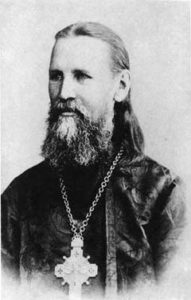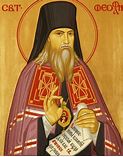SSCORRE!
Saint Sophia Cathedral
Online Resources for our Religious Edification

Topic of the Week:
Saint Paisios, +July 12, 1994
“In every generation God raises up saints, holy men and women whose work especially in this worldly age is to remind us, to show us that there is more to life than the material world around us. Some saints do it by living ordinary lives for God, while others live very extraordinary lives for God. Saint Paisios of Athos was one of the extraordinary ones. Get to know him and you will have no doubt about the reality of the World above and beyond us, which also surrounds us here.
Holy Saint Paisios, pray to Christ our God to save our souls.”
Excerpted from A Late-Twentieth-Century Saint: The Holy Elder Paisios – Fr. Bill’s Orthodox Blog
Adult/Family:
“The basic thing is for man to take care not to lose the Grace of God, so as to have divine enlightenment. For everything is in vain if there is no divine enlightenment.
Those who withdraw themselves from Christ are deprived of divine enlightenment, for like fools they forsake sun-drenched places so as to retire to the shade. Hence, it is natural for them to be cold and fall spiritually ill. God has endowed us all with gifts, but not all of us utilize them for the salvation of our souls and the salvation of our fellow men. Instead, most of us, most of the time, use them to the detriment of others and ourselves.
With this divine enlightenment one easily finds the keys to divine meanings, so as to interpret the Spirit of God in a very simple and natural way, without causing an intellectual headache.
The more a person progresses in the spiritual life attending to himself, the wider the eyes of the soul open and the more clearly he discerns his mistakes and the many benefactions of God. Thus man is humbled and inwardly crushed, and then the Grace of God — divine enlightenment — comes naturally and he becomes more discerning….”
Read more quotes at Saint Paisios the Athonite | iconandlight (wordpress.com)
“People of the 21st century will be saved and even acquire holiness for three obediences:
for keeping the Orthodox faith and transmitting it to others, primarily to their children and grandchildren;
for daily repentance and
for regular participation in the Sacraments of the Church.”
Taken from Orthodox Gladness: St Paisios the Athonite
Preschool:
“I would want very much to be the little donkey that carried Christ, and later I would cry [for Him]!” – Saint Paisios
Elementary School:
“People had known for years that Paisios [who died July 12, 1994] was a saint. Here is how the Orthodox system works: veneration of a holy man or woman grows and grows and sometimes there are miracles, till finally somebody at the top says ‘OK, it’s obvious we’ve got a saint here.’ So finally on January 13, 2015, Elder Paisios of Mount Athos was formally canonized by the Patriarch of Constantinople.
Saint Paisios, in his unique way, was like the ascetic wonder-workers of old. Well, actually there are also many contemporary ones.
Paisios was born in the village of Farasa in Asia Minor, baptized Arsenios. He came to Greece as part of the Greek exodus from Turkey in 1924 and was trained as a carpenter. During the Greek civil war he was a radio operator, which is why later he often taught using radio analogies -for example, if you want to get God’s attention so he’ll hear you during prayer ‘turn the dial to humility.’
Arsenios often put himself in danger in place of his fellow soldiers, saying they had families and he didn’t. After the war he went home to get his sisters suitably settled, then in 1950 went to Mount Athos. He maintained silence as much as possible, often worked while others rested, and loved to read, especially the lives of saints. He was made a monk at Philotheou Monastery and given the name Paisios.
Monk Paisios took an attitude which seemed very strange to others: He held that his own spiritual failures and lack of love were the cause of his neighbors’ shortcomings as well as the world’s ills. So he pushed himself to great self denial and fervent prayer for the sake of the world. Later during the First Iraq War he withdrew almost entirely and devoted himself to prayer about the situation.
Paisios always sought a good reason for people’s actions rather than judging them. Pilgrims to Athos had been scandalized by a certain monk and asked Paisios to get involved. He said don’t judge him, because the monk was actually virtuous, just playing the fool when visitors came so as to preserve his silence. This was very likely not true.
In 1958 Paisios went home to his village to support the faithful against some Protestants who were proselytizing. Then he went to the Sinai for 2 years. The Bedouins loved him: he made wooden handicrafts, sold them and gave the proceeds to the Bedouins for food. In 1964 he returned to Athos, to a hermitage on the far southern tip of the peninsula. In 1968 his health caused him to go to Thessaloniki for lung surgery, but he then returned to his monastery on Mount Athos.
It was now that his fame as an elder began to grow. Pilgrims came to him for counsel and healing. At night he prayed, sleeping only two or three hours. His health was still poor so he went back to Thessaloniki for treatment; staying at Souroti women’s monastery. Here pilgrims came in great numbers all day long, and for the next 26 years till his death he turned no one away, even when he was suffering from cancer and in great pain. He said God is greatly pleased when someone who is suffering does not complain but uses what energy he has to pray for and help others. That is really all there is to be said about the rest of his life.
Elder Paisios received the Holy Eucharist for the last time on July 11, 1994. He died peacefully on July 12 and is buried at Souroti Monastery, where thousands visit his grave each year.
Greece had a series of remarkable elders during the 20th century, wise and gifted spiritual guides, but none has captured peoples’ hearts and minds more around the world than Saint Paisios….”
Read the entire article A Late-Twentieth-Century Saint: The Holy Elder Paisios – Fr. Bill’s Orthodox Blog
Middle School:
Some sayings of Saint Paisios:“There are no people more blessed than those who contact the heavenly “television station” and are… tuned into God. In the same way no people are more wretched than those who have cut off contact with God and wander dizzily around the world flipping through the world’s many television stations so as to forget if only for a short time that their lives are off the track.”
“The goal of reading is the application, in our lives, of what we read. Not to learn it by heart, but to take it to heart. Not to practice using our tongues, but to be able to receive the tongues of fire and to live the mysteries of God. If one studies a great deal in order to acquire knowledge and to teach others, without living the things he teaches, he does no more than fill his head with hot air. At most he will manage to ascend to the moon using machines. The goal of the Christian is to rise to God without machines.”
Taken from OrthodoxWord (wordpress.com)
High School:
“Saint Paisios defined reverence as “the fear of God and spiritual Sensitivity.” He said that reverent people “behave carefully and modestly, because they intensely feel the presence of God.” In my opinion just one minute into this homily Athanasios Rakovalis illustrates what it means to douse your words and thoughts with reverence.
May we be made worthy, through the prayers of Saint Paisios, to do the same in our own lives!”
Read the entire article Fear of God, Spiritual Sensitivity
Listen to the entire homily by Athanasios Rakovalis “Living with St Paisios” (English subtitles) [3:20-5:06 is the introduction described above]
Purchase and read The Gurus, The Young Man, and Elder Paisios
A Message from Maria Spanos
I am passionate about our Orthodox Christian faith and seek to help others learn as much as they can about it. My purpose here is to share online resources that help strengthen our relationship with Christ and bind us closer to His Church. I believe they are invaluable in learning about our precious Orthodox Tradition, and are a great aid for teaching family members, friends and others about Orthodoxy. ~Maria
Two of my favorite quotes:
 “A true Christian behaves in this life so that it may be a preparation for the future one and not only a life here below. In his actions, he does not think what will be said of him here but of what will be said there in heaven; he represents to himself that he is always in the presence of God, of the angels and all the saints, and remembers that someday they will bear witness of his thoughts, words, and deeds.” — Saint John of Kronstadt
“A true Christian behaves in this life so that it may be a preparation for the future one and not only a life here below. In his actions, he does not think what will be said of him here but of what will be said there in heaven; he represents to himself that he is always in the presence of God, of the angels and all the saints, and remembers that someday they will bear witness of his thoughts, words, and deeds.” — Saint John of Kronstadt
__________________________________________________________

“Of all the holy works, the education of children is the most holy.”
— St. Theophan the Recluse






